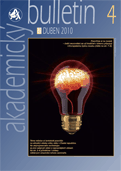Non-university research has a future
The future of non-university research and its connection with higher education institutes, industrial research and business were the main themes of an international conference that the Czech Academy of Sciences organized on Wednesday, 27 May 2015 at its headquarters. The roundtable discussions were attended by the elite of European science – Martin Stratmann (president of the most important German scientific institution, the Max Planck Society), Peter Haslinger (director of the Herder-Institute, Leibniz Association), Soren Wiesenfeldt (director of research at the Helmholtz Association), Ed Noort (vice-president of ALLEA – All European Academies) and other guests from Italy, Great Britain and the USA.
The conference was opened by Deputy Prime Minister of the Government of the CR Pavel Bělobrádek
with a presentation of the scientific policy of the CR, who regarding the Czech Academy of Sciences
said
inter alia: “The Academy of Sciences has always been and continues to be an institution,
which is one of the best that Czech sciences has available in a number of fields. Names like
Heyrovský, Wichterle, Patočka, Ceplecha or the laureate of the national award of the government
Czech Head (Česká hlava) Svoboda, Hobza, Paleček, Holý, and Kurzweil have represented the cream of
Czech research.” The Deputy Prime Minister also spoke about the future of the CAS and its
financing. In this context, he remarked: “Today, it is necessary for science as a whole to engage
far more in the economy as a force that directly speeds economic progress, increases the innovation
potential and helps introduce new technologies. I am clearly saying with all seriousness that this
new approach will be required of scientists. And I thank President of the Czech Academy of Sciences
Jiří Drahoš for fulfilling this plan. On the other hand, I state with the same seriousness that the
requirement for greater ‘economization’ or ‘commercialization’ of research may not in any case mean
some kind of threat to the position of the Academy as an institution that provides fundamental new
discoveries. It may not mean its weakening in terms of institutional, financial or formal aspects.
The Academy of Sciences must have assurance of sufficient funding. Its means may not be curtailed,
cooperation with industry may not be de facto forced with violence. Even in our planning, we count
on institutional financing being strengthened within the prospects for the longer period, so that
researchers could count on a reasonable certainty for their research.”
President of the CAS prof. Jiří Drahoš welcomed the conference participants and introduced
them to the structure of the Academy of Sciences. He dealt extensively with Strategy AV21, the
management and organization of their research programmes. “Research programmes are from the
beginning open to partners from higher education institutes, the entrepreneurial sphere not only in
the CR. Their orientation on the resolution of the problems of society is positively received also
by the decision makers,” stressed the President of the CAS.
The conference brought a number of other crucial facts concerning the mechanism of the
functioning of scientific institutions of European and global non-university research, the method
of their financing and the role in the financing of science in a given country or region and
presented perspectives of their further development in the space of Central-Eastern Europe and
possible forms of scientific cooperation.
28 May 2015






